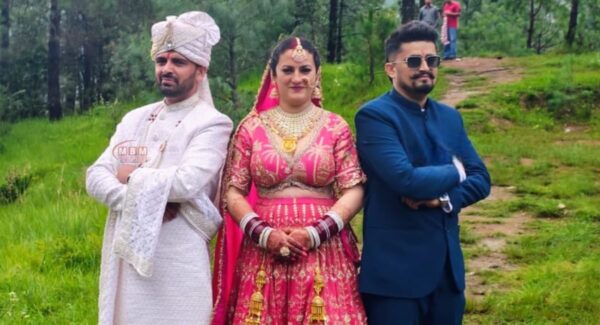News
In Pictures: Two Brothers Marry the Same Woman in Himachal, Rekindling Discussion on Ancient Polyandry Tradition

Nahan, July 19:
A unique wedding in the Shillai region of Himachal Pradesh’s Sirmaur district has sparked widespread discussion across the country. In this unusual ceremony, two biological brothers married the same woman in a public and socially accepted setting — reviving attention on the ancient tradition of polyandry.
Pradeep Negi and Kapil Negi, two brothers from Shillai, were married to Sunita Chauhan, a resident of the nearby Kunhat village. What made the ceremony particularly notable was that it took place openly, in front of cameras and the local community. The brothers jointly participated in the rituals and accepted Sunita as their wife, embracing her equally into their lives.
Sunita also described the marriage as a conscious and voluntary choice. “This was my decision,” she said. “I learned about the tradition, understood it, and accepted it fully and freely. There was no pressure on me whatsoever.”
Kapil is currently working abroad, while Pradeep is involved in a local business. Both men emphasized that their relationship is based on mutual understanding and agreement.
This is not the first such instance in the state. Polyandry is part of a long-standing, though now rare, tradition in several regions of Himachal Pradesh. What sets this case apart is the open and public nature of the ceremony. The wedding reflects the polyandrous custom that was historically observed in areas like Trans-Giri, Kinnaur, Lahaul-Spiti, and parts of Chamba.
Polyandry — the practice of one woman having multiple husbands — is an ancient tradition, with one of its earliest references found in the Mahabharata, where Draupadi was married to the five Pandava brothers. In regions like Kinnaur, people believe this practice is a legacy passed down from the Pandavas. Advocates of the tradition argue that it promotes familial unity, prevents property fragmentation, and helps manage population growth.
In the Trans-Giri belt of Sirmaur, fraternal polyandry (where brothers share a wife) was once common, but over time the practice became nearly extinct or was confined to private households, away from public view.
The wedding received mixed reactions on social media. As pictures and videos of the ceremony circulated online, debate followed. Some viewed it as a revival of tradition, while others criticized it as inappropriate. Many, however, expressed support, recognizing the union as an exercise of free will by all three individuals involved.
It’s important to remember that everyone has the right to express their opinion — but that right ends where it begins to harm someone else’s personal dignity. In other words, feel free to share your thoughts, but do so respectfully, without infringing upon the choices or privacy of others.
